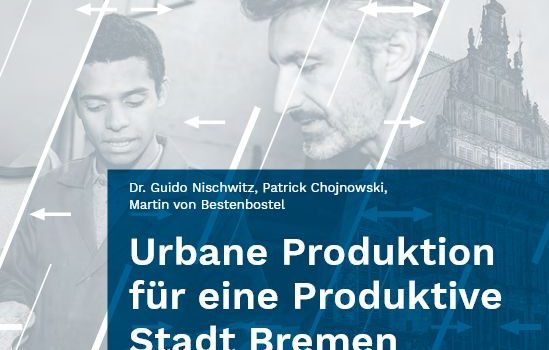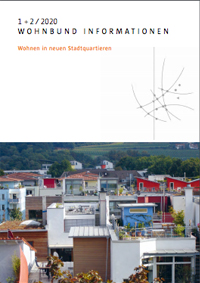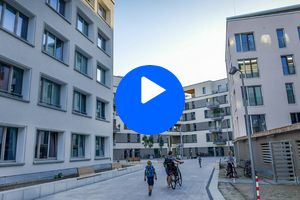The Special price on the topic "Urban development revisited: Prices - Practice - Perspectives" was given to the project Urban development area Stuttgarter Straße, French Quarter in Tübingen. The special prize, which is awarded in parallel to the urban development prize, serves to highlight particularly urgent fields of action in urban development and urban planning. It was awarded on 23.4.2021 on the occasion of the 40th anniversary of the German Urban Development Prize to contributions that had already been recognised with prizes and awards between 1980 and 2010. The judging of the special prize was very complex, as it had to cover a span of 30 years, i.e. a generation, of the achievements of German urban development that were considered outstanding at the time, and, in retrospect, it had to be based on robust, objective criteria that could adequately reflect the complexity of 30 years of urban development history and 30 years of urban development models.
Kategorie für Blog: Mix of uses
 The prize is awarded every two years by the German Academy for Urban Development and Regional Planning (DASL) with significant support from the Wüstenrot Foundation. Urban Development Award in the DSP 2020 competition goes to the project Quarter at the former Blumengroßmark in Berlin. With 81 applications, a particularly large number of projects were submitted for the Urban Design Award. The spectrum was very broad: urban-structural-geographical, thematic, structural-spatial. From the new town hall in the urban planning context of a small municipality to the large conversion project of a metropolitan region, the interdisciplinary jury (urban planning, architecture, open space planning, preservation of historical monuments, economics, sociology) was faced with a very difficult decision in many cases.
The prize is awarded every two years by the German Academy for Urban Development and Regional Planning (DASL) with significant support from the Wüstenrot Foundation. Urban Development Award in the DSP 2020 competition goes to the project Quarter at the former Blumengroßmark in Berlin. With 81 applications, a particularly large number of projects were submitted for the Urban Design Award. The spectrum was very broad: urban-structural-geographical, thematic, structural-spatial. From the new town hall in the urban planning context of a small municipality to the large conversion project of a metropolitan region, the interdisciplinary jury (urban planning, architecture, open space planning, preservation of historical monuments, economics, sociology) was faced with a very difficult decision in many cases.
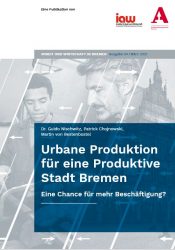 In a research project of the iaw, the conceptual foundations of urban production and the productive city were prepared with a view to the situation in Bremen and analysed in their impact structure. The study makes proposals for describing and recording urban production that is compatible with the city and embedding it in an urban development policy model of a productive city. On the basis of seven reference cities (Vienna, Zurich, Stuttgart, Hamburg, Frankfurt am Main, Wuppertal, Bochum), corresponding activities were filtered out and their transferability to the city of Bremen was examined. In the city of Bremen, eight locations and neighbourhoods (including the Tabakquartier and Kellogg-Areal) were examined with regard to their potential for implementing a productive city.
In a research project of the iaw, the conceptual foundations of urban production and the productive city were prepared with a view to the situation in Bremen and analysed in their impact structure. The study makes proposals for describing and recording urban production that is compatible with the city and embedding it in an urban development policy model of a productive city. On the basis of seven reference cities (Vienna, Zurich, Stuttgart, Hamburg, Frankfurt am Main, Wuppertal, Bochum), corresponding activities were filtered out and their transferability to the city of Bremen was examined. In the city of Bremen, eight locations and neighbourhoods (including the Tabakquartier and Kellogg-Areal) were examined with regard to their potential for implementing a productive city.
 A most welcome piece of news reached the city of Aachen this morning (17 March 2021): Federal Minister Horst Seehofer has announced this year's selection of the "National Projects of Urban Development" and announced that the development of the Büchel old town quarter will receive up to 5.5 million euros in funding. Aachen is thus one of four municipalities in NRW to have been awarded the contract. With the amount of funding, the city is in third place nationwide.
A most welcome piece of news reached the city of Aachen this morning (17 March 2021): Federal Minister Horst Seehofer has announced this year's selection of the "National Projects of Urban Development" and announced that the development of the Büchel old town quarter will receive up to 5.5 million euros in funding. Aachen is thus one of four municipalities in NRW to have been awarded the contract. With the amount of funding, the city is in third place nationwide.
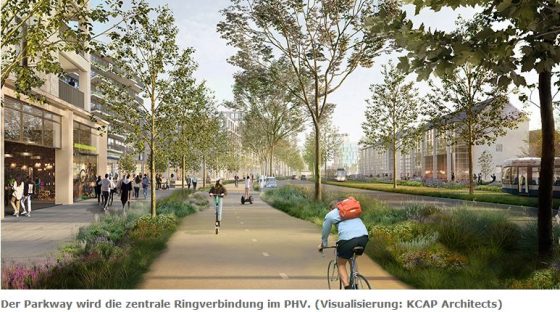 Heidelberg is receiving massive funding from the 2021 urban development programme for two construction projects on conversion sites. The development of Patrick-Henry-Village (PHV) into a new city district has even received the highest funding amount in the entire programme. Heidelberg will receive 3.5 million euros for this project. In addition, the conversion of the sports hall on the former US hospital in Rohrbach will be funded with 400,000 euros. This was announced by the Baden-Württemberg Ministry of Economics on Wednesday, February 3.
Heidelberg is receiving massive funding from the 2021 urban development programme for two construction projects on conversion sites. The development of Patrick-Henry-Village (PHV) into a new city district has even received the highest funding amount in the entire programme. Heidelberg will receive 3.5 million euros for this project. In addition, the conversion of the sports hall on the former US hospital in Rohrbach will be funded with 400,000 euros. This was announced by the Baden-Württemberg Ministry of Economics on Wednesday, February 3.
 On the occasion of the meeting of EU Ministers for Urban Development and Territorial Cohesion on the "New Leipzig Charter", Daniela Wagner, spokesperson for urban development for Alliance 90/The Greens in the German Bundestag, explains:
We welcome the "New Leipzig Charter". Without the transformative power of cities and the ideas and drive of their residents, we will not be able to overcome the challenges of the climate crisis. Nevertheless, the Charter contains significant gaps. The guiding principle of the resilient city is missing. The development of robust and resilient cities is important in order to better assess risks and recognise and prevent dangers in good time. The guiding principle of the healthy city is also not mentioned - despite the heatwaves caused by the climate crisis, a never-ending stream of air pollutants from fossil fuelled combustion engines and the current challenge of a global pandemic.
On the occasion of the meeting of EU Ministers for Urban Development and Territorial Cohesion on the "New Leipzig Charter", Daniela Wagner, spokesperson for urban development for Alliance 90/The Greens in the German Bundestag, explains:
We welcome the "New Leipzig Charter". Without the transformative power of cities and the ideas and drive of their residents, we will not be able to overcome the challenges of the climate crisis. Nevertheless, the Charter contains significant gaps. The guiding principle of the resilient city is missing. The development of robust and resilient cities is important in order to better assess risks and recognise and prevent dangers in good time. The guiding principle of the healthy city is also not mentioned - despite the heatwaves caused by the climate crisis, a never-ending stream of air pollutants from fossil fuelled combustion engines and the current challenge of a global pandemic.
UmweltBank has acquired the former GfK site on Nuremberg's Nordwestring. The company is planning an ecologically and socially sustainable urban quarter with housing, a daycare center, commercial space and public green areas. The new headquarters of the green bank will also be part of the quarter. The previous owner, a joint venture of Pegasus Capital Partners and Art-Invest Real Estate, had already developed an urban development concept in recent years and coordinated it with the City of Nuremberg. UmweltBank would like to further develop this concept in line with its own requirements in close cooperation with the city.
 Now that almost all 570 flats in Germany's largest timber-built housing estate in Prinz-Eugen-Park have been occupied, the Munich planning committee has recommended realising the timber-built follow-up project "Kreativquartier" with 370 residential units.
Here are the key data:
http://sdg21.eu/db/kreativquartier
Now that almost all 570 flats in Germany's largest timber-built housing estate in Prinz-Eugen-Park have been occupied, the Munich planning committee has recommended realising the timber-built follow-up project "Kreativquartier" with 370 residential units.
Here are the key data:
http://sdg21.eu/db/kreativquartier
Newly built districts with space-efficient mobility offers
A new sustainable urban district is being built on the west side of the Merwedekanal in a central location not far from Utrecht Central Station. The plan is to create a mixed-use district with 6,000 to 9,000 homes for approximately 12,000 residents. The area will become a showcase for healthy and sustainable living with innovative concepts for recycling, energy production, climate adaptation and mobility solutions. Planned completion: by 2024
 21.01.2020 Everyone is talking about sustainability - including the construction industry. A prize that the Federal Ministry for the Environment, Nature Conservation and Nuclear Safety (BMU) and the Federal Environment Agency (UBA) have been offering since today provides the appropriate topic for discussion: With the new "Federal Award for Environment and Building", which will be awarded for the first time in 2020, the initiators want to distinguish projects with exemplary character in terms of sustainability - not only in the classic areas of existing buildings and new buildings, but also in five other categories. All players in the building sector can apply. The deadline for entries is 15 April 2020.
21.01.2020 Everyone is talking about sustainability - including the construction industry. A prize that the Federal Ministry for the Environment, Nature Conservation and Nuclear Safety (BMU) and the Federal Environment Agency (UBA) have been offering since today provides the appropriate topic for discussion: With the new "Federal Award for Environment and Building", which will be awarded for the first time in 2020, the initiators want to distinguish projects with exemplary character in terms of sustainability - not only in the classic areas of existing buildings and new buildings, but also in five other categories. All players in the building sector can apply. The deadline for entries is 15 April 2020.
 The aim of the handbook is to provide municipal actors with concrete tools that can be used to keep and locate production in urban areas. In the joint project UrbaneProduktion.Ruhr, funded by the Federal Ministry of Education and Research, research was carried out from October 2016 to December 2019 into whether and how it is possible to bring production back to the city.
The aim of the handbook is to provide municipal actors with concrete tools that can be used to keep and locate production in urban areas. In the joint project UrbaneProduktion.Ruhr, funded by the Federal Ministry of Education and Research, research was carried out from October 2016 to December 2019 into whether and how it is possible to bring production back to the city.
Germany's largest cooperative housing project in Berlin 28:58 min Video available until: 12/02/2020 First broadcast on: 2.12.2019 Living in the metropolis, in a large community, according to its own rules. Central, energy-saving, ecological, cosmopolitan, inclusive. The residents of Möckernkiez in Berlin-Kreuzberg have fulfilled this dream.
Dynamic master plan for the Patrick Henry Village presented / Citizen participation from 9 December A central park with a lake in the centre, diversity in architecture and in the use of buildings, energy production directly in the neighbourhood, a ring road, large neighbourhood garages, the public space for it free of parking spaces - these are just a few aspects from [...]
Anne Katrin Bohle has been State Secretary for Construction at the Federal Ministry of the Interior, Building and Housing since March 2019. The "Leipzig Charter" is to be further developed into the "Leipzig Charter 2.0" by the time of the German EU Council Presidency in 2020. The "Leipzig Charter", which is little known even among experts, invokes the values of "citizens' co-determination and self-determination, calls for the [...]
"Düsseldorfer Erklärung zum Städtebaurecht" (Düsseldorf Declaration on Urban Planning Law) 50 city planning councillors, department heads and heads of planning offices from over 40 German cities, including Hamburg, Hanover, Munich, Cologne, Bochum, Freiburg, Stuttgart and Frankfurt am Main, have signed the "Düsseldorfer Erklärung zum Städtebaurecht" (Düsseldorf Declaration on Urban Planning Law). They are calling for a fundamental amendment of the Building Use Ordinance (BauNVO) and the administrative regulation TA-Lärm, so that in future beautiful and [...]
Demand Paper of the Alliance of Young Cooperatives Berlin of March 9, 2018 In order to advance the construction of affordable housing, an Alliance of Young Cooperatives was founded in Berlin in 2017. "Housing cooperatives have been a cornerstone of the socially responsible and affordable housing market in Berlin for well over 100 years," notes the cooperative board of Bremer Höhe and [...]
with sociologist Patrick Sachweh "It feels like everything is becoming more and more unequal - but people still don't want more redistribution. Sociologist Patrick Sachweh knows why." in the Süddeutsche Zeitung from 10.9.2016
Lecture by Richard Sennett and Saskia Sassen on 9 June 2016 at the Oskar von Miller Forum (International Meeting Centre of the Bavarian Construction Industry) in Munich.
The Montag-Stiftung Urbane Räume (Bonn) refers to real estate developed by many for many and contributing to the common good as Immovielien. A website of the foundation has now gone online, documenting in detail exemplary projects from which one can be inspired: from the ExRotaprint in Berlin to the Elsebad [...]


